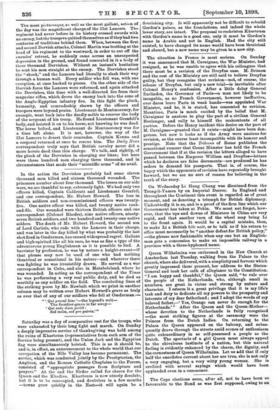The most picturesque, as well as the most gallant, action
of the day was the magnificent charge of the 21st Lancers. The regiment had never before in its history crossed swords with an enemy, but the troopers quitted themselves as if they had two centuries of traditions behind them. When, between the first and second Dervish attacks, Colonel Martin was trotting at the head of his regiment to the westward, in order to cut off the enemies' retreat, he suddenly came across an unsuspected depression in the ground, and found concealed in it a body of three thousand Dervishes. Without an instant's hesitation he sent his men straight at the enemy. The Dervishes stood the "shock," and the Lancers had literally to slash their way through a human wall. Every soldier who fell was, with one exception, at once hacked to pieces. On the other side of the Dervish force the Lancers were reformed, and again attacked the Dervishes, this time with a well-directed fire from their magazine rifles, which drove the enemy back into the zone of the Anglo-Egyptian infantry fire. In this fight the pluck, humanity, and comradeship shown by the officers and troopers were beyond praise. Lieutenant de Montmorency, for example, went back into the deadly molee to recover the body of the sergeant of his troop. He found Lieutenant Grenfell's body, and hoisted it on to his horse, not knowing he was dead. The horse bolted, and Lieutenant de Montmorency was for a time left alone. It is not, however, the way of the 218t Lancers to desert their comrades. Captain Kenna and a corporal returned at once to rescue him. The Daily News correspondent truly says that British cavalry never did a more heroic deed than this charge. We talk, and rightly, of the pluck of the Dervishes in charging our lines; but here were three hundred men charging three thousand, and in circumstances that made their "scientific arms" of no avail.


































 Previous page
Previous page